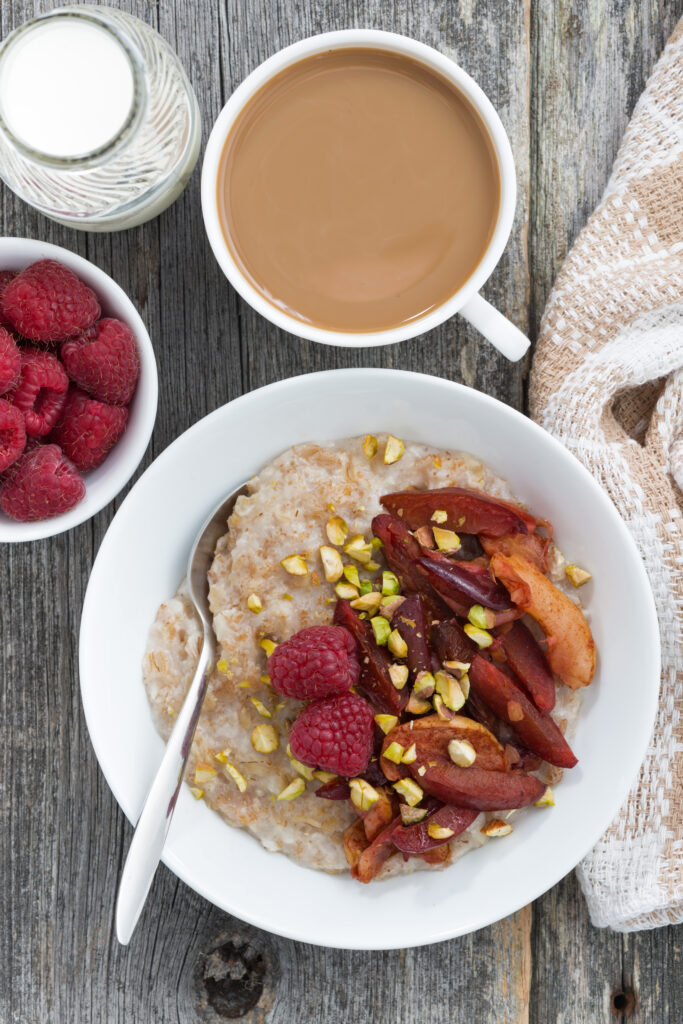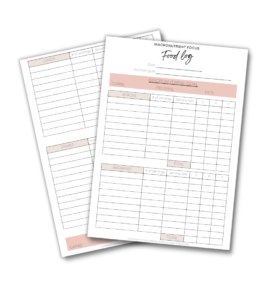Being in a calorie deficit but not losing weight is an incredibly frustrating situation to be in. Maybe the answer lies in checking your insulin levels…

There are many reasons why one could be in a calorie deficit but not losing weight. Actually, the biggest reason why that may happen would be because… you’re just not in a calorie deficit.
Maybe you’re not tracking your calories correctly… and that happens more often than you think. If not, you might be snacking a little bit here and there. Individually, they don’t have many calories… but add them up and you might have your answer there.
If you’re sure that you have the number of calories in check, then you might want to consider that you’re in a plateau. It happens ever so often, especially if you’ve been going to the gym and in a deficit for a long time.
Before looking elsewhere, you might want to consider changing things up to get yourself out of that plateau. Change workout plans, the frequency and intensity of workouts, and the number of calories.
And if that still doesn’t work… well you might want to consider looking into your insulin.
This blog post is about looking out for bad insulin level signs if you’re in a calorie deficit but not losing weight!
IN A CALORIE DEFICIT BUT NOT LOSING WEIGHT: LOOKING AT INSULIN
The Role of Insulin
Insulin is a hormone that plays a crucial role in regulating glucose metabolism, the primary energy source for the body’s cells. Here is a little breakdown of how it works:
- When you eat carbohydrates, your body breaks them down into glucose (a form of simple sugar)
- The glucose then enters our bloodstream, which sends a signal to our pancreas to release insulin into the bloodstream as well
- In turn, the insulin signals the cells in your body to absorb the glucose (read about the insulin signalling pathway for more detail)
- Once inside the cell, glucose can be metabolized for energy or stored as glycogen (many glucose molecules linked together in a branching chain) in the liver and muscles for later use.
In a little more detail…
Insulin signalling pathway
Should you want more detail, here is a breakdown as to how insulin communicated with the cell to encourage glucose absorption:
- Insulin binds to insulin receptors on the cell surface
- This activates an enzyme called tyrosine kinase, which in turn phosphorylates (adds a phosphate group) intracellular proteins
- In turn, this activates a protein called Akt (protein kinase B), which phosphorylates another protein called AS160.
- AS160 causes insulin transporters GLUT4 to move from intracellular storage vesicles in the cytoplasm of the cell to the cell membrane
- Once at the membrane, the GLUT4 transporters inset themselves into the membrane and allow glucose to enter the cell
What Is Insulin Resistance?
Insulin resistance occurs when the cells become less responsive to the effects of insulin, either because insulin is not being produced or used effectively. In other words, cells do not use insulin effectively to move glucose from the bloodstream to the cells.
About 40% of people are insulin resistant, and the numbers only seem to be growing. Many believe that it is enough to measure carb intake and blood sugar levels. However, this is not always true: insulin and blood glucose are NOT the same things, though they go hand-in-hand.
This causes 3 main side effects:
- Increased blood sugar levels, which can lead to Type 2 Diabetes
- Glucose uptake is decreased
- The pancreas produces more insulin in an attempt to compensate for the decreased responsiveness of cells to insulin
- Long-term obesity
- Sedentary lifestyle
- Medical conditions such as PCOS, sleep apnea, and fatty liver disease
- Chronic inflammation
- Poor diet
Common Symptoms of Insulin Resistance
There are quite a few symptoms that we generally associate with insulin resistance.
It’s important to note that not everybody with insulin resistance will experience all the following symptoms, and some might not experience any. Blood tests are always the most reliable way to find out.
- Increased hunger, especially after meals
- Fatigue and weakness, caused by the interference of converting glucose into energy
- Weight gain, particularly in the midsection
- High blood sugar levels
- Skin changes, particularly dark patches of skin on the neck, elbows or knees
- Polycystic ovary syndrome (PCOS), which can cause irregular menstrual cycles, weight gain, and fertility problems
Nutrition Coaching
Train hard. Eat well. Build your body one day at a time.
Train hard. Eat well.
Build your body one day at a time.
1-to-1 coaching. A sustainable nutrition plan. A lifetime of knowledge.
Insulin Resistance Symptoms You Don't Know About
These are a list of symptoms that you might not know are representative of insulin resistance.
Before going further, I would like to note that the presence of ONE of these symptoms does not necessarily indicate insulin resistance. Indeed, alone, these symptoms can be caused by a wide variety of things.
However, the key is noticing if many of these (as well as the more common ones) happen often, and at the same time.
1. Extreme hunger in the morning
Because of the way insulin plays on hormones and blood sugar levels, it can also cause extreme hunger upon waking up.
During the night, our glucose stores are used up to maintain our basic metabolic processes, such as breathing and heartbeat. Since we wouldn’t want our glucose levels to deplete completely when we sleep, the body releases cortisol and glucagon which help increase glucose levels again.
However, as mentioned before, the bodies of those with insulin resistance do not seem to respond to normal levels of insulin and glucose. Therefore, the pancreas, cortisol and glucagon have to work overtime.
This excess level of cortisol and glucagon ends up stimulating ghrelin, the hunger hormone, which ends up exasperating our hunger and cravings in the morning.
Basically, a normal amount of hunger in the morning is to be expected (you just came out of a 7-10 hour fast!). But being REALLY hungry… not so much.
2. Greasy skin
Greasy skin can be a side-effect of a wide variety of things. (We’ve all been through that embarrassing part of puberty, right? 😅)
However, if you’re an average adult and often wake up to greasy skin despite a healthy lifestyle, then it might be a sign of insulin resistance.
This is due to the relationship between insulin resistance and androgens. Simply put, insulin resistance promotes the production of these male sex hormones called androgens (which, worry not, are also normally present in women). Since androgens relate to a myriad of anabolic and growth effects, they are in and of themselves responsible for greasy skin.
In addition to this, insulin resistance also interfered with inflammation regulation. Indeed, high levels of insulin stimulate inflammation in the skin which in turn contributes to the development of acne and greasy skin.
3. Excessive facial hair
Bouncing off the above topic, excess (or simply more than usual) facial hair is related to insulin resistance. Indeed, since excess insulin causes excess androgens, it can lead to hormonal imbalances, such as irregular menstrual cycles, acne and excess hair growth.
As above, this originates from the production of androgens in the ovaries, which is a key characteristic of PCOS. Insulin increases the activity of an enzyme called cytochrome P450c17. Without further detail, this increased androgen production.
Furthermore, high levels of insulin can also interfere with the body’s ability to regulate sex hormone-bonding globulin (SHBG), a protein which binds the androgens and other hormones in the bloodstream, regulating their availability. Therefore, when insulin is high in the bloodstream, SHBG levels tend to be lower, which can further increase the availability of androgens.
4. Changes in eyesight and light sensitivity
Insulin resistance can be tied to changes in eyesight and light sensitivity.
High blood sugar levels can damage blood vessels in the retina, the part of the eye responsible for transmitting visual signals to the brain. Over time, this damage can lead to a condition called diabetic retinopathy, which 1 in every 3 diabetics have.
Furthermore, insulin resistance can affect the function of the nerves that control the muscles in the eye, leading to changes in the way the eye moves and increased difficulty in focusing on objects.
5. Cavities
There is some evidence to suggest that insulin resistance may be associated with an increased risk of dental cavities. Though the relationship between cavities and insulin resistance isn’t fully understood, I might as well mention it!
Insulin resistance can lead to high blood sugar levels, which can increase the growth of harmful bacteria in the mouth. These bacteria feed on sugars and produce acids that can erode tooth enamel and lead to the development of cavities.
In addition, insulin resistance can also increase inflammation in the body, which can contribute to periodontal disease, a more serious form of gum disease that can also increase the risk of dental cavities.

Want a free
MACRONUTRIENT FOOD LOG?
Make smarter food choices and plan your meals with this Macronutrient-focused food log. Fill out the form below and have the Food Log delivered straight to your inbox!
What Foods To Eat
There isn’t a magical food that will suddenly make you insulin sensitive. In fact, this comes with lifestyle changes, or even prescription medication if need be. However, there are definitely some foods that can help the cause.
1. Monounsaturated fats
Monounsaturated fats help insulin resistance in several ways:
- They improve the body’s ability to use insulin effectively. Monounsaturated fats can help increase the number of insulin receptors in the body, which helps the cells respond better to insulin.
- They improve the function of the mitochondria. and reduce inflammation. This helps enhance insulin signalling and glucose metabolism, which can ultimately lead to improved insulin sensitivity.
- Though the exact mechanism isn’t fully understood, monounsaturated fats can increase the expression of genes involved in insulin signalling and glucose metabolism, such as GLUT4 and IRS-1. These genes help to increase the number of insulin receptors in the body.
Examples of foods that are high in monounsaturated fats are the following:
- Macadamia nuts, or any other nuts
- Avocados 🥑
- Seeds, such as pumpkin seeds (but avoid seed oils)
- Dark chocolate
2. Proteins
You’re just going to have to get used to the fact that protein is great for you. It really looks like protein is the solution to a bunch of problems… and, well, it is.
In this case (as in soooo many others), protein’s benefits are varied, yet extremely effective. These are the main ones:
- Protein increases satiety, which leads to less intake of saturated fats in the long run
- Protein regulates blood glucose levels by slowing the absorption of glucose into the bloodstream and preventing spikes in glucose levels
- Allows for more muscle development. Since muscles are the tissues that absorb glucose in the first place, you want more of that to control glucose levels
3. Amylase inhibitors
Amylase inhibitors are responsible for inhibiting the activity of the enzyme amylase (duh.)
In more concrete terms, this enzyme is responsible for breaking down carbohydrates into glucose in the digestive system. Therefore, by inhibiting it, it can reduce the rate at which carbs are broken down into glucose and released into the bloodstream.
Foods containing amylase inhibitors are not easily accessible. And are mostly found in the raw form, which is inconvenient for lack of a better word:
- Flour: high activity of amylase inhibitors was found in wheat flour, whole wheat flour and whole rye flour. However, after backing into bread, activity drops by 80-90%.
- Spaghetti: significant activity was found in uncooked spaghetti, but only 2% of it is left after boiling.
- Bananas: though the research on bananas is not extremely developed, there is evidence to show that it does contain amylase inhibitors, particularly in their unripe state.
- Garlic and Onion Oil: not easy to come by, but at least easier to eat than raw spaghetti
- White kidney bean extract: you will find this in the supplement section!
This blog post was all about how insulin resistance can be the reason why you are in a calorie deficit but not losing weight.
It can be an extremely frustrating situation, but at least not you’re one step closer!
xx LS
Share this post







